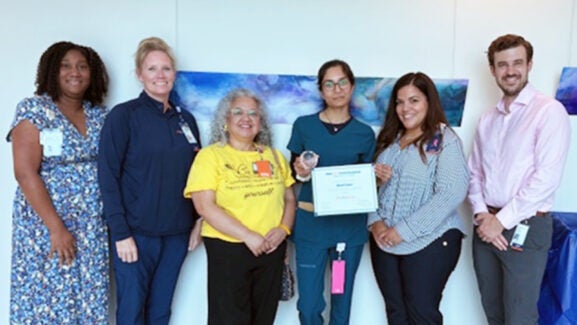

UVA Health Expands Access to Advanced Stroke Prevention Procedure
UVA Health is advancing stroke prevention through the introduction of an innovative, minimally invasive procedure known as TransCarotid Artery Revascularization (TCAR). This groundbreaking technique — transforming how carotid artery disease is treated — now is available at UVA Health Prince William Medical Center.
TCAR offers a safer, less invasive alternative to traditional carotid surgery through a hybrid technique and multidisciplinary approaches.
“This is a way to treat carotid artery disease without a big operation,” says M. Travis Chaney, MA, BSN, RN, CNOR, Senior Director, Perioperative services, UVA Health’s community medical centers and clinics in Northern Virginia and Culpeper. “In conventional carotid surgery, physicians work near several important cranial nerves — those that control the tongue, shoulder, voice box, and the corner of the mouth. Temporary nerve irritation from inflammation is not uncommon. With TCAR, the risk of permanent cranial nerve injury is near zero.”
The TCAR procedure involves making a small incision just above the collarbone, allowing access to the carotid artery and the insertion of a small stent. One of TCAR’s key safety features is flow reversal: blood is redirected temporarily away from the brain through a closed-loop system, capturing any dislodged plaque before returning the blood to the body via a vein in the leg. This significantly lowers the risk of stroke during the procedure.
“TCAR can be performed under general anesthesia or under local anesthesia with sedation,” Chaney adds. “It’s like being at the dentist — you need to stay still for about an hour and a half. Most patients do very well, and the procedure itself is typically an hour shorter than a traditional endarterectomy.”
Faster recovery is another benefit. Most patients go home the next day. Driving is restricted until a patient can turn their neck without significant pain. With the small, transverse incision used in TCAR, that usually just takes two or three days. In contrast, recovery from traditional surgery can take a couple of weeks.
Although TCAR is minimally invasive, careful blood pressure monitoring remains essential after the procedure to support healing and prevent complications.
TCAR is beneficial especially for patients at higher risk for complications from open surgery —offering shorter recovery times, fewer long-term side effects, and lower risk of cranial nerve damage. With its combination of surgical precision and advanced technology, TCAR is a promising option for many patients with carotid artery disease — and now available in UVA Health's local community medical center setting.
Latest News



